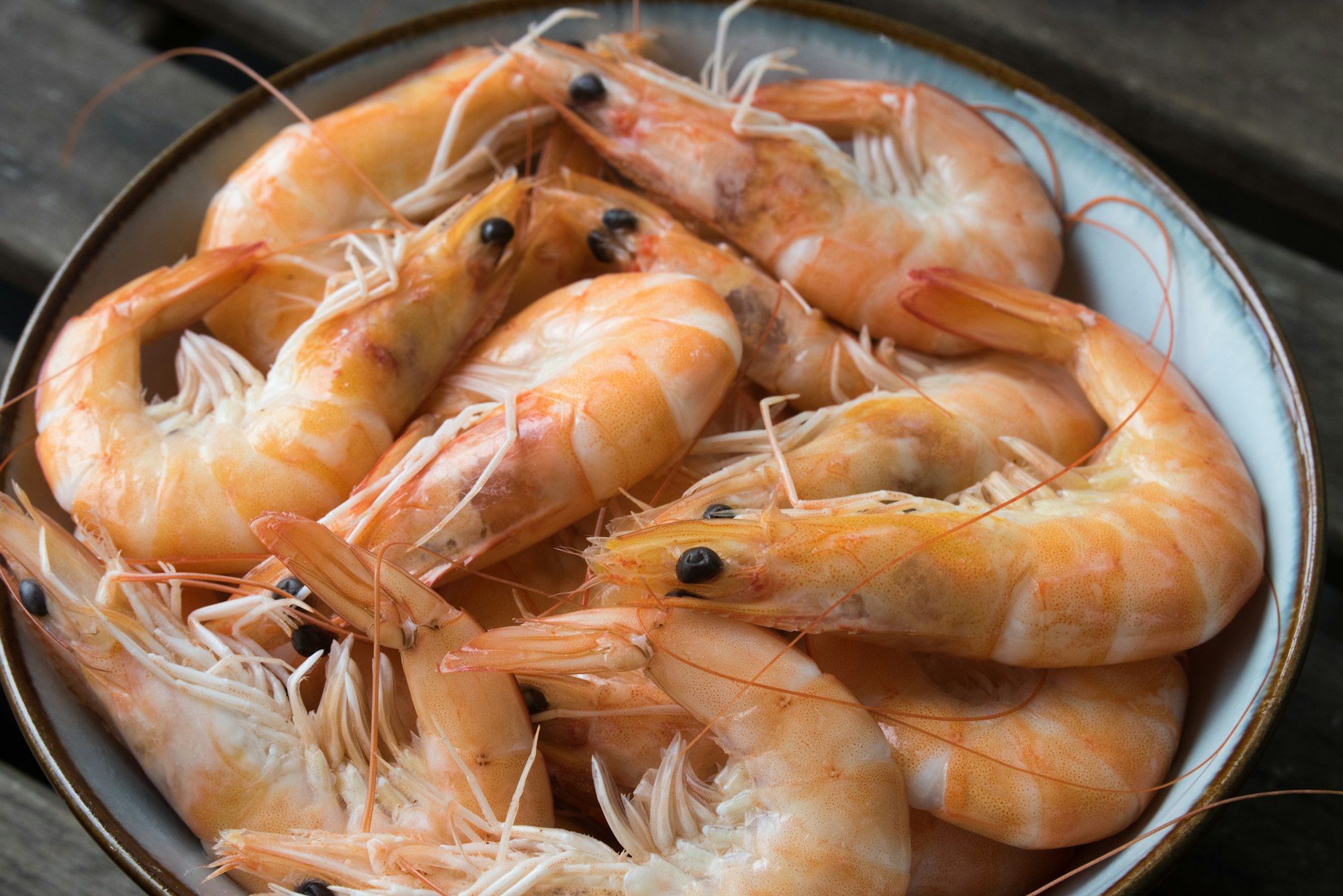We often wonder if our furry friends can eat shrimp. Can dogs eat shrimp? Let's explore the facts.
Shrimp isn't toxic to dogs, but it should only be given in moderation. Dogs have different dietary needs than humans. Shrimp can be high in cholesterol and sodium, so it's best to check with your veterinarian first. Cooked shrimp, without seasoning or additives, is the best way to give it to your dog. It provides lean protein, essential omega-3 fatty acids, and antioxidants. The AKC says shrimp can be an occasional treat, but seafood shouldn't be a staple in their diets.

Can Dogs Eat Shrimp?
Can dogs eat shrimp?
| Can Dogs Eat Shrimp? |
|---|
| Yes |
Shrimp can be a good protein, vitamin, and mineral source for doggies! But, be careful and give it in moderation - due to potential allergies. Ask your vet before adding shrimp to the pup's diet.
Shrimp has omega-3 fatty acids that help skin and coat health. Plus, antioxidants that boost the immune system and fight inflammation. This is great for dogs with joint issues.
One dog owner was cautious and gradually added shrimp to her pup's diet. He had an upset stomach at first, but no further issues. So, monitor reactions when introducing new food.
It's important to check with your vet before adding shrimp or any new foods to your pup's diet. Every dog is different!
Factors to consider before feeding shrimp to dogs
Shrimp and dogs? Think twice!
- Allergies can cause itching, diarrhea, or vomiting.
- Raw shrimp may have bad bacteria like E. coli or Salmonella.
- Shells and tails can be a choking hazard.
Cooked shrimp may be okay, but chat with your vet first.
A friend of mine learned the hard way. Their pup couldn't keep away from shrimp cocktail. This caused a tummy ache and a quick visit to the vet. They realized it's important to think about what's best for your dog before getting into seafood.
Benefits of feeding shrimp to dogs
Shrimps can be beneficial for our furry friends! Advantages include:
- Lean protein to help build and repair tissues
- Omega-3 fatty acids for a healthy coat and skin
- Antioxidants to strengthen the immune system
- Minerals such as iron, zinc, and selenium
- Astaxanthin in shrimps can reduce inflammation and joint pain
- Shrimps also provide fiber to improve digestion
But, shrimp must be prepared properly before being served. Cook thoroughly without any seasoning or additives that may harm your pup.
Talk to your veterinarian for specific recommendations based on your dog's needs. Remember, moderation is key. Treat shrimp as an occasional supplement rather than a primary component of their diet.
How to safely feed shrimp to dogs
Feeding shrimp to dogs can be safe - with the right precautions. Here are 3 steps for a safe & enjoyable meal:
- Cook shrimp thoroughly. Remove shells & tails - choking hazards. Clean & make sure there are no harmful seasonings/spices.
- Let shrimp cool before serving. Moderate temp helps avoid burns & discomfort.
- Start with small portions & observe reaction. Helps spot allergies & adverse reactions.
Remember: moderation is key! Too much shrimp might cause digestive problems. Always check with your vet about dietary needs & allergies.
Believe it or not, dogs have been eating seafood for centuries - even before commercial pet food! Ancient coastal cultures fed their dogs fish & shellfish, full of omega-3 fatty acids, vitamins & minerals.
Treat your pup with some shrimp goodness - just keep safety in mind!

Alternatives to shrimp for dogs
When seeking substitutes for shrimp for your pooch, there are several options that can be incorporated into their diet safely. Consider these:
- Fish - such as Salmon, Tuna and Whitefish - are great sources of Omega-3 fatty acids and provide essential nutrients.
- Plus, Chicken is a lean protein which is easily digestible and can be served cooked or raw.
- Turkey is also a protein-packed option, offering essential amino acids and vitamins.
- Vegetables including carrots, green beans and sweet potatoes can be great alternatives to shrimp.
When making changes to your pup's diet, remember to consult with your vet and introduce new foods bit by bit, monitoring your furry friend's response.
Moderation is key!
Conclusion
Dogs can eat shrimp, but there are some very important points to remember:
- Cook shrimp thoroughly - to avoid bacterial contamination.
- Take off the shell and tail - these can be a choking hazard.
- Moderation is key - too much shrimp can cause digestive issues.
Also, some dogs may have allergies to seafood. Monitor your dog for any reactions. Pro Tip: Consult your vet before adding shrimp to your pup's diet.

Frequently Asked Questions
FAQ: Can dogs eat shrimp?
Q: Is it safe for dogs to eat shrimp?
A: Yes, dogs can eat shrimp as long as it is properly cooked, unseasoned, and served in moderation. However, it is important to remove the shell, tail, and digestive vein to prevent any potential health issues.
Q: Are there any benefits of feeding shrimp to dogs?
A: Shrimp is a great source of protein, vitamins, and minerals for dogs. It contains omega-3 fatty acids which are beneficial for the skin, coat, and joint health. However, it should only be given as an occasional treat and not as a staple food.
Q: Can dogs have an allergic reaction to shrimp?
A: Yes, some dogs may be allergic to shrimp just like humans. Symptoms of an allergic reaction may include itching, swelling, vomiting, or diarrhea. If you suspect an allergy, it is best to consult with a veterinarian.
Q: Can dogs eat raw shrimp?
A: It is not recommended to feed dogs raw shrimp. Raw shrimp may contain harmful bacteria and parasites that can cause digestive upset or even lead to serious illnesses. Therefore, it is safer to always cook shrimp thoroughly before feeding it to your dog.
Q: How should shrimp be prepared for dogs?
A: Shrimp should be cooked by boiling, steaming, or grilling without any added seasoning. It should be served in small, bite-sized pieces after removing the shell, tail, and digestive vein. Avoid using oil, butter, or spices as they can be harmful to dogs.
Q: Can all dogs eat shrimp?
A: Not all dogs can safely eat shrimp. Dogs with existing health conditions such as pancreatitis, obesity, or gastrointestinal sensitivity should avoid shrimp due to its high cholesterol and fat content. Additionally, it is always recommended to consult with a veterinarian before introducing any new food into your dog's diet.





